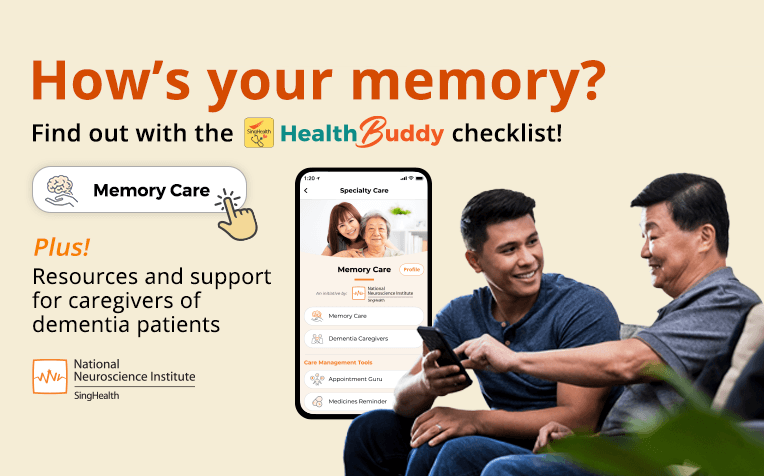Alzheimer's Disease: Signs and Symptoms
Alzheimer's disease is the most common form of dementia. The Department of Neurology at National Neuroscience Institute (NNI) shares some of the signs and symptoms to look out for.

symptoms, especially during the mild stage, are not easy to recognise and can be confused with normal ageing.
Alzheimer's disease: Most common form of dementia
Alzheimer's disease is the most common form of dementia and accounts for about 70 per cent of all cases. In an Alzheimer's patient, the brain cells degenerate gradually and eventually die, causing memory loss and a decline in other mental functions which affect day-to-day functioning.
"There is no cure for Alzheimer's disease though there are drugs which can slow the progression of symptoms," shares Adjunct Associate Professor Shahul Hameed, Senior Consultant from the Department of Neurology at National Neuroscience Institute (NNI), a member of the SingHealth group.
This progressive brain disease usually occurs in older people, with symptoms typically appearing after the age of 60. However, there are a small number of patients who may develop Alzheimer's early, between the ages of 30 to 60. This is known as early onset Alzheimer's.
There are three general stages of the disease – mild, moderate and severe – and it may take years for the patient to progress from one stage to the next. Research suggests that the changes in the brain related to Alzheimer's can begin as much as a decade or more before symptoms first appear.
"The course of Alzheimer's differs from patient to patient but the disease is usually diagnosed at the mild stage. Alzheimer's causes brain cells to die and the affected brain regions to shrink in size. The damage is irreversible," says Adj Assoc Prof Hameed.
Signs and symptoms of Alzheimer's
The symptoms of Alzheimer's disease are not always easy to recognise and can be confused with normal ageing. One of the first signs of the disease is short-term memory loss with patients forgetting conversations and even where they live. Symptoms worsen at each stage of the disease.
The following are common signs and symptoms of Alzheimer's:
Mild Alzheimer's
- Repeat questions
- Have difficulty remembering directions and recognising surroundings
- Have trouble handling money, paying bills and balancing a cheque book
- Take more time than usual to complete daily tasks
- Misplace everyday items, often keeping them in inappropriate places, e.g. putting keys or reading glasses in the refrigerator
- Display mood and personality changes such as increased anxiety, restlessness and aggression
- Have poor judgement, e.g. wear warm clothing on a scorching day
Moderate Alzheimer's:
- Have long-term memory loss and forget their personal information such as name, occupation and date of birth
- Forget common words and the names of everyday objects
- Have trouble recognising family and friends
- Be unable to learn new things
- Have difficulty in carrying out tasks that involve several steps, e.g. bathing, getting dressed and cooking a meal
- Have trouble coping with new situations
- Experience hallucinations, delusions and become paranoid
- Display impulsive behaviour
Severe Alzheimer's
- Be unable to communicate
- Groan and grunt
- Have trouble swallowing food and eating
- Have lack of control of bladder and bowels
- Sleep most of the time
- Develop skin infections
"In the final stage of the disease, Alzheimer's patients may be bedridden and completely dependent on caregivers," says Adj Assoc Prof Hameed.
See page 2 to learn about the causes of Alzheimer's, and how the condition is diagnosed and treated.
See page 3 to learn find out how sundowning (or sundown syndrome) affects Alzheimer's patients.
Tap the banner above to find out how Memory Care on the Health Buddy app can help you maintain or improve your memory. Plus, get tips on how to care for a loved one with dementia.
Ref. S13
Check out more articles on brain diseases:
How to Detect Brain Diseases Early (Stroke, Parkinson's, Dementia, Eplilepsy)
Dementia Caregiver Tips: Understanding Dementia Behaviours
For HealthXChange
Terms of Use / Disclaimer
All information provided within this web and mobile application is intended for general information and is provided on the understanding that no surgical and medical advice or recommendation is being rendered. Please do not disregard the professional advice of your physician.

No comments:
Post a Comment
Note: Only a member of this blog may post a comment.